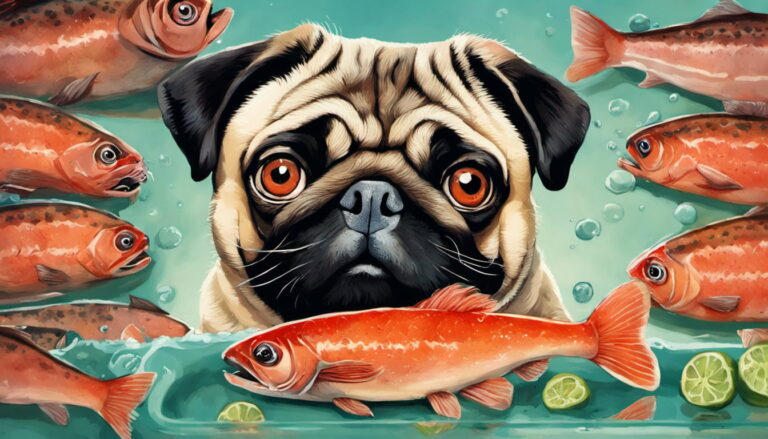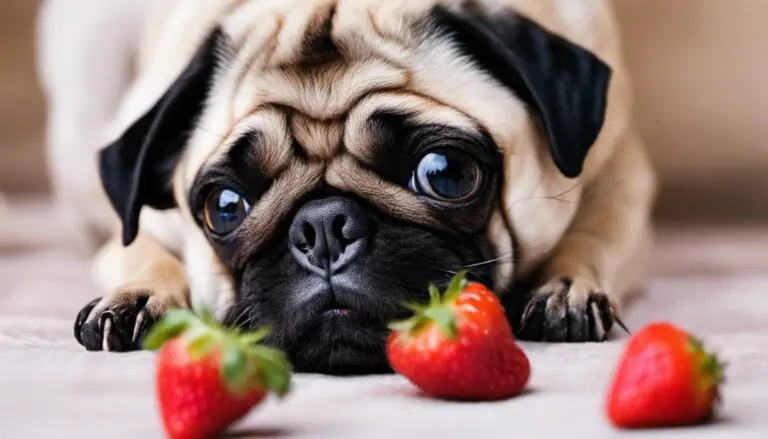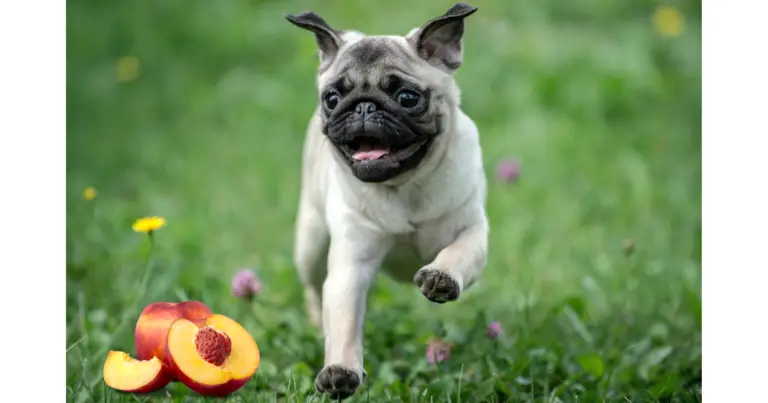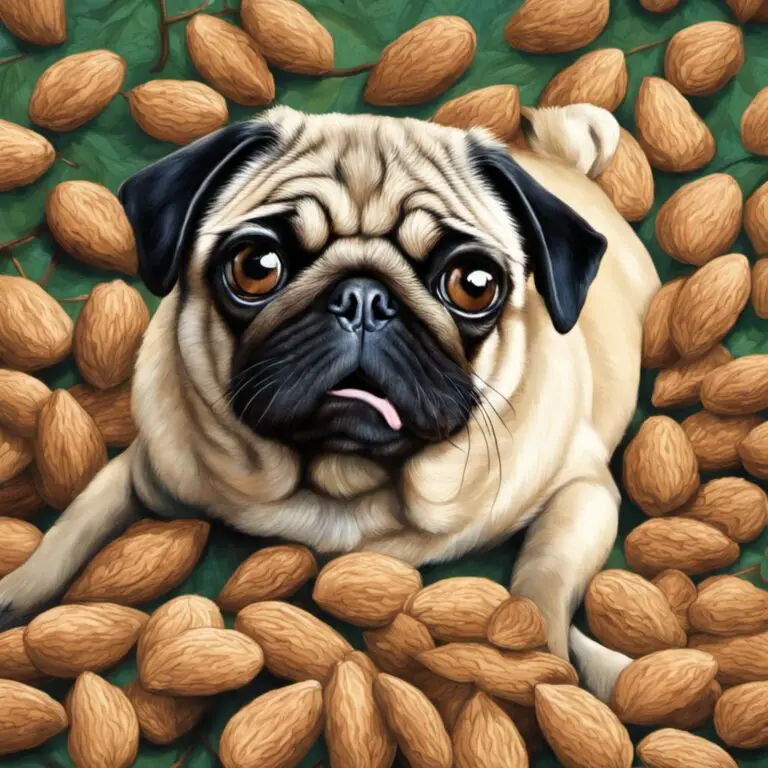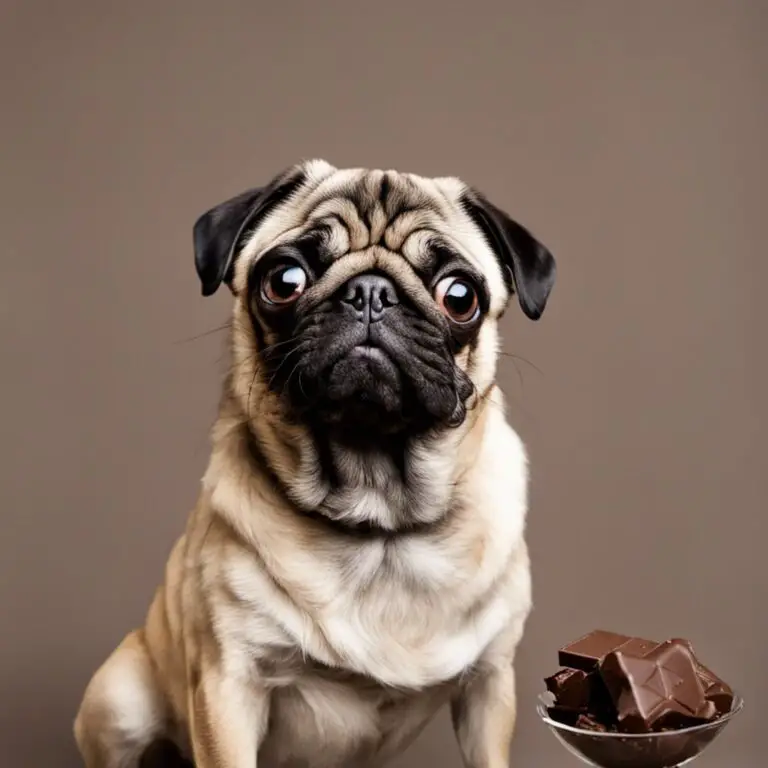Can Pugs Eat Celery? – A Brief Exploration on the Topic
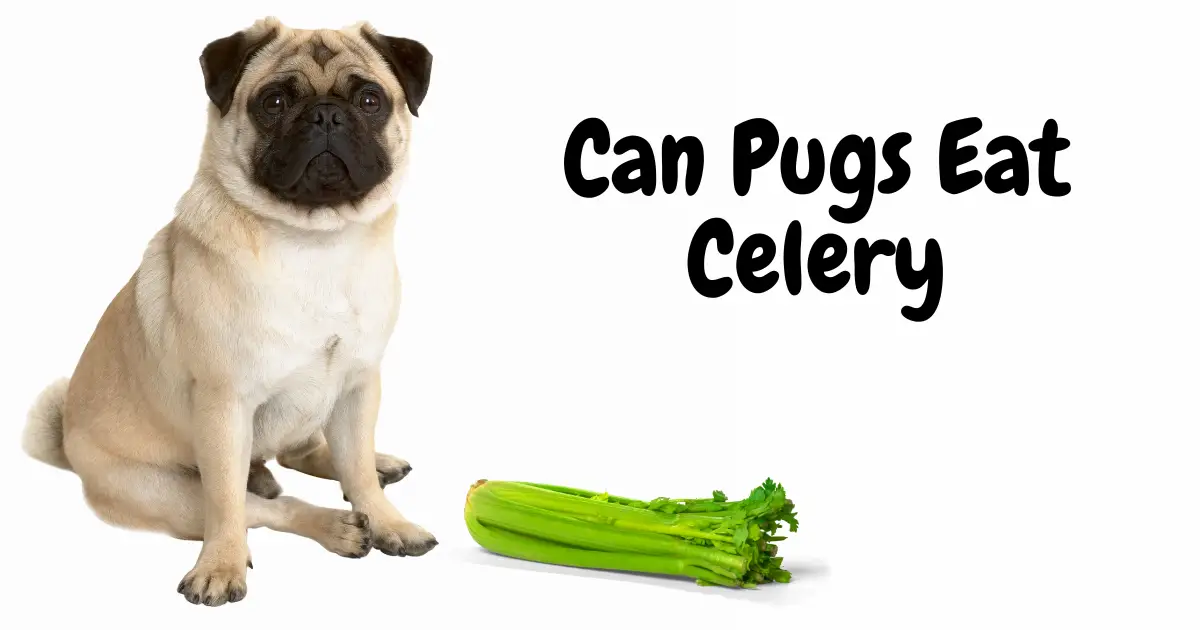
Many dog owners always look for safe and healthy snacks to share with their furry companions. The question that often comes up is, “Can pugs eat celery?” The good news for pug owners is that celery, including pugs, is a great low-calorie treat for dogs. It can be both a delicious and beneficial snack when prepared correctly for your canine friend.
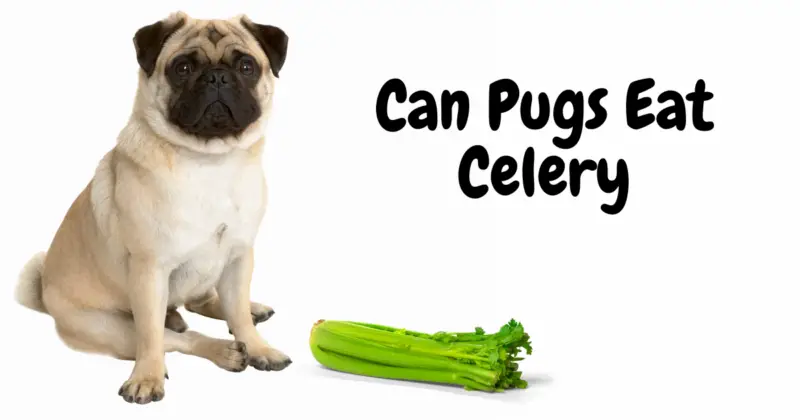
Celery is an excellent source of fiber, vitamins A, C, and K, as well as other essential nutrients such as folate, potassium, and manganese. Not only does it provide health benefits, but it has also been known to freshen up a dog’s breath. Veterinarians even recommend giving celery to dogs struggling with weight gain due to its low-fat content.
When feeding your pug celery, cut it into small, manageable pieces to avoid choking hazards, and serve it fresh or cooked without any added seasonings or additives. This way, your pug can safely enjoy this nutritious treat and reap its many benefits.
Contents
Table of Contents
What Pugs Can Eat
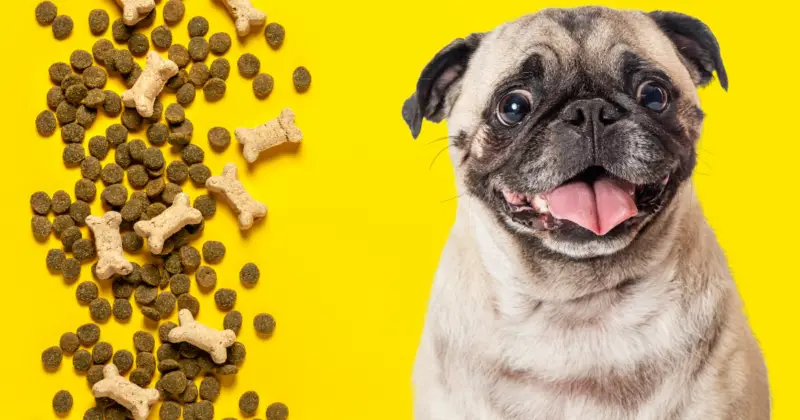
Understanding Pug Dietary Needs
Pugs, like all dogs, require a balanced diet to maintain their health. Their diet should consist of a combination of proteins, fats, carbohydrates, vitamins, and minerals. It is crucial to choose the right combinations of food for your pug to maintain a healthy weight and provide the necessary nutrients for growth and development.
Get The Free Food Eating Guide That Keeps My Pug Happy and Playful Even at 13 Years Old
100% Beginner Friendly & Lists Real Foods Your Pug Can Actually Eat!
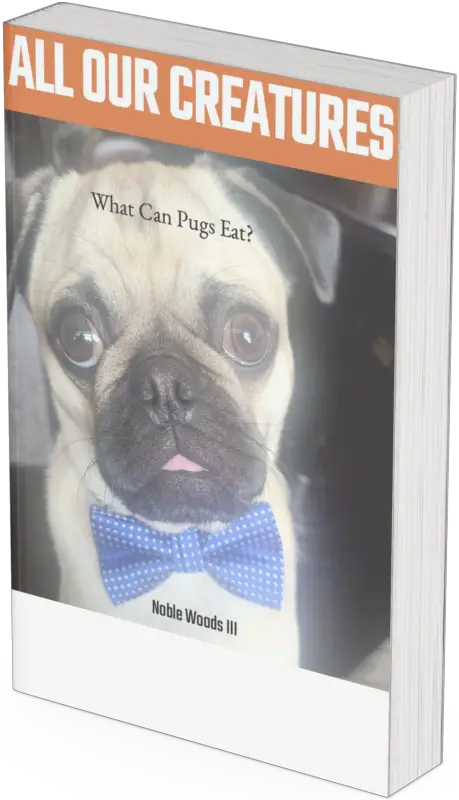
Safe Fruits and Vegetables for Pugs
Fruits: Pugs can benefit from consuming certain fruits as they provide vital nutrients, vitamins, and antioxidants. Some safe fruits for pugs include:
- Apples: Rich in vitamins A and C and fiber, apples can be a great low-calorie snack for pugs. Make sure to remove the seeds and core before feeding it to them 1.
- Cantaloupe: Low in calories and high in water content, cantaloupe can help keep pugs hydrated and revitalized without causing weight gain2.
Vegetables: Vegetables can be an excellent source of vitamins, minerals, and fiber for pugs. Some safe vegetables for pugs include:
- Carrots: Excellent for dental health, carrots are a nutritious, low-calorie snack for pugs.
- Celery3: Celery is a low-fat, healthy vegetable that can be fed to pugs to promote weight management and proper nutrition.
- Green Beans: Rich in vitamins and minerals, green beans can be fed to pugs as a low-calorie and nutritious snack.
- Spinach: Spinach is packed with vitamins and minerals, providing excellent health benefits for pugs.
- Zucchini: This low-calorie vegetable is a safe option for pugs to consume.
- Cabbage: Cabbage is a safe and healthy option for pugs, providing them with essential nutrients and fiber.
- Peas: Pugs can safely consume peas as a source of vitamins, minerals, and dietary fiber.
While many fruits and vegetables can be a healthy addition to a pug’s diet, it is essential to be aware of toxic foods such as mushrooms, grapes, and raisins, which should be avoided. Always consult your veterinarian before introducing new foods to your pug’s diet.
Note: The amounts of the mentioned foods should be adjusted according to the pug’s weight, size, and dietary needs. Always introduce new foods slowly to avoid any digestive issues.
Can Pugs Eat Celery? Watch this
Celery as a Part of Pug’s Diet
Nutritional Benefits of Celery
Celery is a healthy and low-calorie option that can be included in a Pug’s diet. It contains various essential vitamins and minerals, such as vitamins A, B, C, and K, manganese, potassium, and magnesium. These nutrients are crucial for maintaining good health, promoting a healthy heart, and even fighting cancer. Besides, celery is an excellent source of fiber, which aids in digestion and supports gut health.
The antioxidant properties of celery, due to its vitamin C and beta-carotene content, provide a boost to your Pug’s immune system. Moreover, it is low in calories, fat, and cholesterol, making it an ideal treat for Pugs, especially those on a weight management plan. However, it does contain 32 milligrams of sodium, so it’s essential to monitor the portion size given to your Pug.
Preparing Celery for Your Pug
Ensuring that celery is safe for your Pug to consume involves some necessary preparation. First and foremost, always opt for fresh and organic celery to avoid any harmful pesticides or chemicals. Rinse the celery thoroughly under running water to remove any dirt or debris.
Before serving, cut the celery into small, bite-sized pieces to avoid any choking hazards. A pug’s teeth and jaw structure may make it challenging to chew larger pieces, so always keep the size appropriate for your dog. Moreover, removing the seeds and skin from the celery stalks may further reduce any potential risks.
It’s also worth mentioning that celery can be served both raw and cooked to your Pug. However, it’s vital to avoid adding any seasoning, oils, or other ingredients that may be unsafe for dogs. Stick to plain, unseasoned celery to ensure your Pug gets all the nutritional benefits without any harmful additives.
In summary, incorporating celery into your Pug’s diet can offer a range of nutritional benefits, promoting their overall health. Be mindful of the sodium content and the preparation process to ensure your Pug enjoys celery safely and healthily.
Potential Hazards of Feeding Celery to Pugs
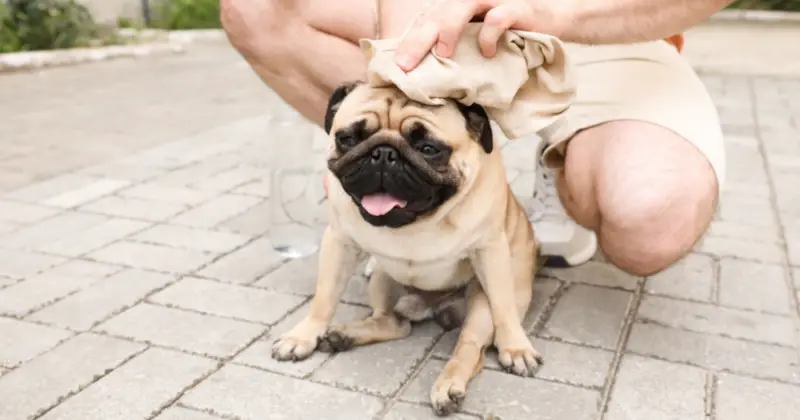
Toxic Foods for Pugs
Although celery is a safe and healthy treat for pugs, it is crucial to be aware of other foods that can cause harm. Some common toxins in human food include garlic and onions, which can damage a dog’s red blood cells, leading to anemia.
Avocados contain a toxin called persin, which can cause vomiting and diarrhea in dogs. Grapes, cherries, and apples also pose a risk if ingested, as they contain harmful substances for dogs.
Pugs should also avoid high sugar content, as it can contribute to obesity and dental issues. Fruits like oranges, bananas, and mangoes should be fed in moderation due to their sugar content. Blueberries and peaches can be included in a pug’s diet as they contain beneficial nutrients but should still be given sparingly.
Observe caution when it comes to providing treats like peanut butter, as some brands may contain additives like xylitol, which is toxic to dogs. Some vegetables, such as potatoes, must be cooked properly to prevent digestive issues.
Choking Risks with Celery
Introducing celery as a treat in a pug’s diet is generally safe, but there are some precautions to take to prevent choking hazards. When serving celery to a pug, cut it into bite-sized pieces to ensure that the dog has an easier time chewing and swallowing the vegetable. Avoid giving large chunks of celery, as they can get lodged in the animal’s throat, creating a choking hazard.
It is crucial to monitor your pug while it snacks on celery to ensure that it does not experience any difficulties. If you notice your pug struggling to chew on the vegetable, consult a veterinarian for advice on safely including celery in the dog’s diet.
In conclusion, feeding celery to pugs can be a healthy option as long as it is done correCan Pugs Eat Cauliflower? A Nutritional Guide for Pug Ownersctly. Being knowledgeable about potential hazards, such as toxic foods and choking risks, ensures that a pug’s diet remains safe and balanced.
Health Issues and Diets for Pugs
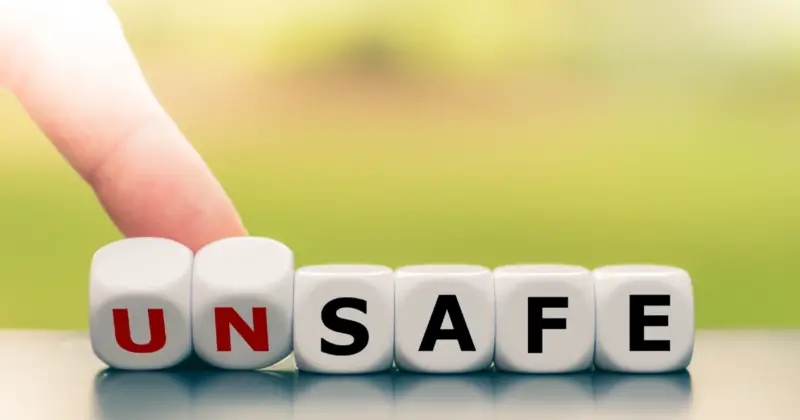
Obesity in Pugs
Obesity is common among Pugs due to their love for treats and propensity to overeat. This can lead to various health problems, including joint issues, diabetes, and even a compromised immune system. To prevent obesity in your Pug, providing a well-balanced diet with appropriate portion sizes and limited treats or snacks is essential. Regular exercise, like short walks and play sessions, will also help to maintain a healthy weight and boost their overall well-being.
When it comes to human food, moderation is key. Some safe options to include in your Pug’s diet are low-fat, nutritious options like celery. Veterinarians often recommend celery as a good snack for dogs struggling with weight gain due to its low-fat content and high nutritional value.
Digestive Issues in Pugs
Pugs can be prone to digestive issues like diarrhea and vomiting if they consume inappropriate or excessive amounts of human foods. Symptoms like these could indicate that your Pug’s diet might need some adjustments. It’s crucial to consult with your veterinarian if you’re unsure about the right diet for your dog.
When feeding your Pug human foods, always ensure that they are cooked and easy to digest. Introduce new foods slowly and in small portions to avoid overwhelming their digestive system. Your Pug’s coat can also be an indicator of its overall health and nutrition, so if you notice any changes, it is advisable to consult with your veterinarian to make sure their diet is meeting all of their needs.
In conclusion, maintaining a healthy, well-rounded diet is crucial for preventing health issues in Pugs. Feeding your Pug a proper diet tailored to their specific needs using guidelines from your veterinarian will ensure optimal health and well-being. Remember to practice moderation in feeding human food, like celery, and always consult a vet if you’re considering any significant changes to your Pug’s diet.
Consulting a Veterinarian
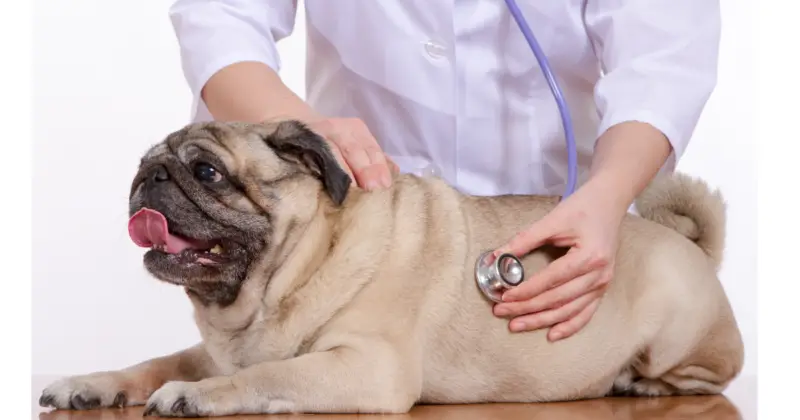
When considering adding new treats or food items to your pug’s diet, it is essential to consult a veterinarian to ensure proper nutrition and safety. Pugs, like all dog breeds, have specific dietary requirements and food sensitivities that should be taken into account.
Celery, for example, has been deemed a safe and low-fat treat for pugs by veterinarians. However, discussing any adjustments to your pug’s diet with your vet is always best. They can provide personalized advice based on your pug’s unique health history and nutritional needs.
Veterinarians have the expertise to identify foods that may be toxic or harmful to pugs. Although celery is safe, certain foods, such as chocolate and grapes, can be extremely harmful to dogs. A vet can inform you of potential risks associated with specific foods and guide you on how much and how often to give your pug new treats.
In addition to safety concerns, veterinarians can provide guidance on the nutritional components of different foods. Celery is a low-calorie treat for dogs that offers vitamins and minerals. These valuable nutrients can help maintain a healthy, balanced diet for your pug. Your vet can help you ensure that your pug is getting the right nutrients in the proper proportions.
Remember to always cut celery into bite-sized pieces for your pug to avoid choking hazards. A veterinarian can also advise on appropriate portion sizes and the frequency of these treats in your pug’s diet. By consulting a vet, you can be confident that you are providing your pug with a safe, healthy, and nutritious diet.
FAQs: Can Pugs Eat Celery
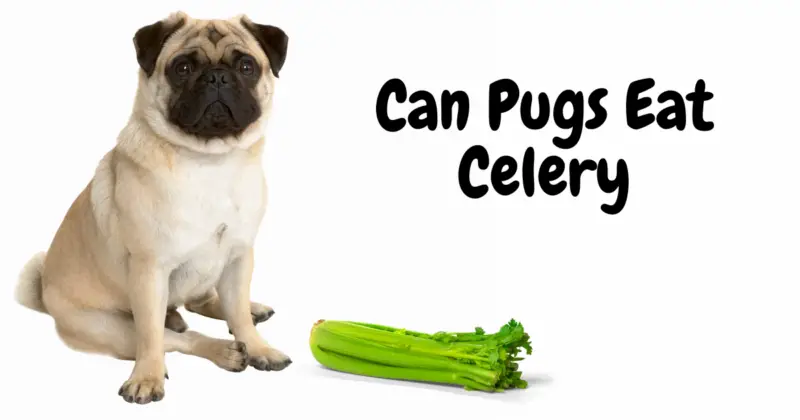
What vegetables are safe for pugs?
Pugs can safely consume a variety of vegetables, including celery. Other suitable vegetables for pugs are carrots, cucumbers, green beans, and cooked sweet potatoes. Always introduce new vegetables gradually and monitor your pug’s reaction to avoid any adverse effects.
How much celery can a pug consume?
Dogs can enjoy celery in moderate amounts. For pugs, a small piece as an occasional treat is appropriate. Too much celery might be difficult to digest and cause gastrointestinal discomfort.
Is cooked celery better for dogs?
Both fresh and cooked celery can be a healthy, low-calorie treat for pugs as long as it’s prepared correctly. Cooked celery should be unseasoned to avoid any harmful ingredients. Whether you choose fresh or cooked celery, it’s important to chop it into small, manageable pieces to prevent choking.
Can pugs have other vegetables like carrots and cucumbers?
Yes, pugs can enjoy snacking on vegetables like carrots, cucumbers, and celery. These low-calorie, nutritious treats are great for maintaining your pug’s weight and overall health. However, always introduce new vegetables gradually and monitor your dog’s reaction.
Is raw celery harmful to pugs?
Raw celery is not harmful to pugs when fed in appropriate amounts and properly chopped. Ensure that the celery pieces are small enough to prevent choking. As always, moderation is key to maintaining your pug’s health and preventing any gastrointestinal issues.
What alternatives to celery can pugs eat?
There are many other healthy snack alternatives for pugs, such as carrots, green beans, cucumbers, and cooked sweet potatoes. These low-calorie vegetables offer a variety of nutrients and can help support your pug’s weight and overall health. Be sure to introduce new foods gradually and observe your pug’s reaction to ensure their well-being.


